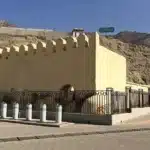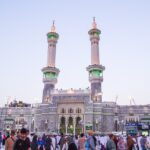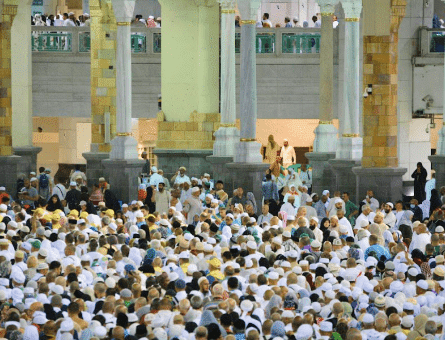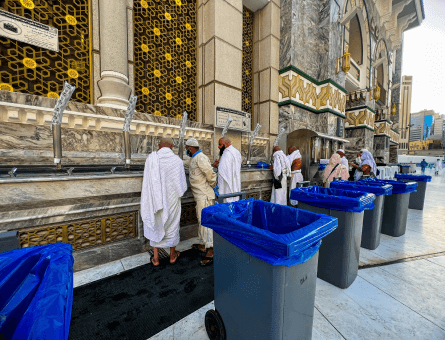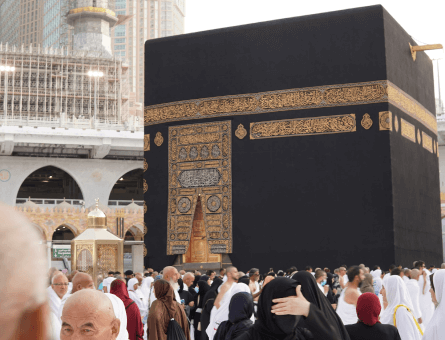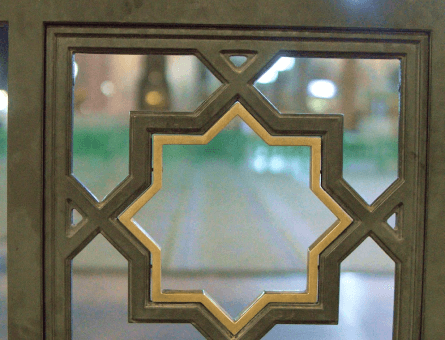How To Perform Tawaf – Your Complete Guide – Duas, Rules and More
Tawaf is one of the easiest yet most significant rituals in Islam. It is an act of worship and a mandatory ritual for pilgrims who intend to perform Hajj and Umrah. Because it is a holy ritual, there are a number of duas and prerequisites associated with Tawaf.
Comprising seven rounds around the Holy Kaabah, a Tawaf starts at Hajar al-Aswad (Black Stone) and ends at the same spot. Keep reading to learn how to perform Tawaf the correct way.
Purpose of Tawaf
Being the principal rite of pilgrimage, Tawaf is a significant part of both the minor and major pilgrimage (Hajj and Umrah). Tawaf is derived from the Arabic term Taafa. It refers to the act of walking or circumambulating the Holy Kaaba in circles in an anti-clockwise motion.
The Tawaf comprises seven circles, each starting and ending at Hajar al-Aswad. One complete circuit of the Holy Kaaba is known as “Shawt.”
Allah SWT in the Holy Quran says, “And He it is Who created the night and the day, and the sun and the moon. They float, each in an orbit.” [Holy Quran, Al-Anbiyaa’: 33]
The aforementioned verse refers to the scientific fact that the balance of everything in the universe depends upon revolution. The solar system orbits the centre of our galaxy, the planets revolve around the sun, and the moon revolves around the Earth, each in its own orbit. The same law of revolution applies to the smallest element in the universe, the atom, as it encircles the nucleus.
Contemplating the fact that revolution is indeed a cosmic law, circumambulating the Holy Kaaba symbolises the oneness of Allah SWT and the submission of the believers. The Kaaba is the spiritual centre for the believers, and every round refers to re-strengthening one’s faith and bringing them closer to Allah SWT.
“And ˹remember˺ when We assigned to Abraham the site of the House, ˹saying,˺ “Do not associate anything with Me ˹in worship˺ and purify My House for those who circle ˹the Ka’bah˺, stand ˹in prayer˺, and bow and prostrate themselves. Call ˹all˺ people to the pilgrimage. They will come to you on foot and on every lean camel from every distant path..” [Holy Quran, Al-Hajj: 26-27]
Before Tawaf
Similar to any other act of worship, whether verbal or non-verbal, making an intention before performing Tawaf is mandatory. If you don’t know how to make Niyyah (intention) for Tawaf, here is a dua you can recite.
In Islam, there are two aspects to Niyyah. The first one is the intention itself. The second one is the intention for the One for whom the act is carried out. Making the intention is what helps distinguish an ordinary act from an act for worship that is performed for the sake of Allah SWT.
اللَّهُمَّ إِنِّيْ أُرِيْدُ طَوَافَ بَيْتِكَ الْحَرَامِ فَيَسِّرْهُ لِيْ وَتَقَبَّلْهُ مِنِّيْ
Transliteration: Allāhumma innī urīdu l-ṭawwafa baytika l-ḥarāmi fa yassirhu lī wa taqabbalhu minnī.
Translation: O Allah, I intend to perform Tawaf of the Sacred Mosque, so accept it from me and make it easy for me.
Men in Ihram are instructed to cover their left shoulder and expose their right shoulder, this is called Al-idh’tiba.
During Tawaf
The Messenger (PBUH) of Allah SWT has instructed the Muslim Ummah to perform Tawaf with extreme humility while remembering the greatness and power of Allah SWT and the Holy Kaaba. It is advised not to talk about worldly or unnecessary things and to avoid drinking or eating while carrying out the ritual of Tawaf.
Imam Nawawi (RA) said, “One must pay good attention to one’s sincerity, devotion, presence of heart and etiquette in both one’s apparent and hidden actions; gaze; demeanour and manner because the Tawaf is prayer. It is necessary to uphold all its etiquettes and fill the heart with the emotions of one who is performing the Tawaf of His House.”

Recite the following supplication when you are saluting, kissing or touching Hajar al-Aswad for the first time:
سْمِ اللَّهِ وَاللّٰهُ أَكْبَرُ، اللَّهُمَّ إِيْمَاناً بِكَ وَتَصْدِيْقاً بِكِتَابِكَ، وَوَفَاءً بِعَهْدِكَ، وَاتِّبَاعاً لِسُنَّةِ نَبِيِّكَ مُحَمَّدْ
Transliteration: Bismi llāhi wa llāhu akbar, Allāhumma īmānan bika wa taṣdīqan bi kitābika wa wafā’an bi ahdika wattibā’an li sunnati nabiyyika Muḥammadin (PBUH).
Translation: In the name of Allah, Allah is the greatest. O Allah, out of faith in You, conviction in Your book, in fulfilment of Your covenant, and in emulation of Your Prophet’s Sunnah (PBUH). [Al-Tabarani]
However, if you cannot remember this dua, remember that Imam Ibn Hibban (RA) said, “Specifying a Dua would take the moment away, because, with specific Duas, one will merely be repeating words, whereas this occasion is for any Dua and for remembering one’s Lord with humility and sincerity.”
Therefore, there’s no compensation, and one is allowed to recite any dua they remember during Tawaf. At a minimum, one should begin with Allah’s name (saying Bismillah) and recite the Takbeer (saying Allahu Akbar) when beginning the Tawaf.
Duas to Read During Tawaf
Here is a breakdown of duas that you can recite while performing the rituals of Tawaf:
At the Start of Tawaf
Ali ibn Talib (RA) recited the following dua:
سْمِ اللَّهِ وَاللّٰهُ أَكْبَرُ، اللَّهُمَّ إِيْمَاناً بِكَ وَتَصْدِيْقاً بِكِتَابِكَ، وَوَفَاءً بِعَهْدِكَ، وَاتِّبَاعاً لِسُنَّةِ نَبِيِّكَ مُحَمَّدْ
Transliteration: Bismi llāhi wa llāhu akbar, Allāhumma īmānan bika wa taṣdīqan bi kitābika wa wafā’an bi ahdika wattibā’an li sunnati nabiyyika Muḥammadin (PBUH).
Translation: In the name of Allah, Allah is the greatest. O Allah, out of faith in You, conviction in Your book, in fulfilment of Your covenant, and in emulation of Your Prophet’s Sunnah (PBUH). [Al-Tabarani]
At the Rukn al-Yamani
It is recorded by Ibn Majah, that whoever recites the following Dua at the Yemeni corner, seventy thousand angels say “Amin” to it:
اللهم إني أسألك العفو والعافية في الدنيا والآخرة
Transliteration: Allāhumma innī as’alukal ‘afwa wal ‘afiyata fid dunya wal ākhirah
Translation: O Allah, I ask You for Your forgiveness and protection in this life and the next.
Between the Rukn al-Yamani and the Hajar al-Aswad
The following supplication was recited by the Prophet Muhammad (PBUH):
رَبَّنَا آتِنَا فِيْ الدُنْيَا حَسَنَةً وَّفِيْ الآخِرَةِ حَسَنَةً وَّقِنَا عَذَابَ النَار
Transliteration: Rabbanā ātinā fi d-dunyā ḥasanatan wa fi l-ākhirati ḥasanatan wa qinā ‘adhāba n-nār.
Translation: O our Lord, grant us the good of this world, the good of the Hereafter, and save us from the punishment of the fire.
Generally speaking, there is no other supplication specified in the Sunnah to recite during the Tawaf. One should endeavour to recite as many supplications and remembrance they can from their heart at this point.
Where to Start the Tawaf
Upon entering the Grand Mosque (Masjid al-Haram), make sure that you are in the state of Wudu. Walk towards the Mataf area, where Hajar al-Aswad (Black Stone) is situated. To be exact, you must start Tawaf from the corner of the Holy Kaaba that faces the single minaret. To make it easier for pilgrims to identify the starting point, the Saudi Ministry of Hajj and Umrah has also installed a green light on the Masjid wall opposite to the Holy Kaaba. Just stand there facing the House of Allah SWT and ensure that Hajar al-Aswad is to your right.
Rules of Tawaf
Abdullah ibn Abbas (RA) narrated that Prophet Muhammad (PBUH) said, “Tawaf around the House is similar to Salah except that you may talk during it. So whoever talks in it, then talk only good.” [Al-Tirmidhi]

Despite the permission to walk, move, and talk while performing Tawaf, most of the prerequisites are similar to that of Salah. Here is a list of the rules and regulations that you must follow to ensure that your Tawaf is accepted by Allah SWT.
- You must be in the state of wudu.
- You must make Niyyah (intention) for Tawaf.
- Start performing the Tawaf from Hajar al-Aswad (Black Stone).
- You must make sure to circumambulate the Holy Kaaba seven times in an anti-clockwise direction.
- If the crowd is too large and you are unable to touch or kiss Hajar al-Aswad, you can simply point in the direction and say, “Allah Akbar.”
Why Do We Perform Tawaf 7 times?
Akin to prayer, Tawaf is an act of worship. It is described as an obligation similar to prayer, except that one is allowed to move and talk while performing Tawaf. Allah SWT and his beloved Messenger (PBUH) have instructed us to perform Salah five times a day, fast thirty days in Ramadan, and perform Hajj at least once in our lives.
In other words, we carry out certain acts of worship in a specific way simply because Allah SWT has commanded us to do so, and Prophet Muhammad (PBUH) has claimed it to be righteous.
By performing Tawaf, we are able to refocus on the centrality of the spiritual focus that we also have while completing other forms of worship including the daily prayers.
Thus, with the belief that Allah SWT knows best and doesn’t order us to do anything that would not benefit us, we must have faith in the Almighty’s decision and should perform Tawaf seven times without questioning why.
At the end of the day, the ultimate purpose of Tawaf is to recognise and embrace the fact that a believer’s life revolves around remembering and thinking of Allah SWT.
Historically, the number 7 in Arabic is often used to refer to ‘many.’ For example, Allah SWT in the Holy Quran states, “Where all the trees on earth to be made into pens, and the sea ink, with seven more seas yet added to it, the words of God would not be exhausted.” [Holy Quran, 31: 27]
In the verse mentioned above, ‘seven more seas’ is a figurative phrase used in the sense that the Almighty’s words wouldn’t be exhausted even if they were written with ink made of any number of seas.
Can You Perform Tawaf Without an Ihram?
The right answer to this would be that it depends upon the type of Tawaf you intend to perform. For instance, in case you are performing Tawaf as a voluntary act of worship, then you are allowed to wear any modest clothing in Islam.
On the flip side, if you are performing Tawaf as part of the pilgrimage (Hajj or Umrah), then wearing the Ihram is mandatory.
However, in either case, being in the state of ablution (wudu) is a must. The Messenger (PBUH) of Allah SWT has instructed us to be free of all impurities when performing Tawaf.
What do we Recite During Tawaf?
One thing that you must know is that there are no preset duas to recite while performing Tawaf. The Messenger (PBUH) of Allah SWT has recommended that one can make as many supplications as they want to the Almighty.

Different Types of Tawaf
Prophet Muhammad (PBUH) said, “Whoever performed Tawaf around the House fifty times, he will be as free of his sins as the day his mother bore him.” [Musannaf Ibn Abi Shaybah, 12808]
There are several different types of Tawaf in Islam, each for a specific purpose of worship. This is why it is essential to make Niyyah (intention) at the beginning for the specific kind of Tawaf that you are going to perform. Here is a brief guide to the different types of Tawaf:
- Tawaful Qudum: It is mandatory for a pilgrim to perform Tawaful Qudum in the state of Ihram upon entering Masjid al-Haram with the intention to perform Hajj al-Ifrad or Hajj al-Qiran.
- Tawaful Wada: Otherwise known as the Farewell Tawaf, Tawaful Wada is performed at the end of Hajj.
- Tawafuz Ziyarah: Performed between the dawn of the 10th of Dhul-Hijjah to sunset on the 12th of Dhul-Hijjah, it is essential to perform Tawafuz Ziyarah before returning to Makkah. It is also known as Tawaf al-Ifadhah.
- Tawaful Nadhr: If you have made a vow to Allah SWT to perform Tawaful Nadhr, it must be performed at any cost.
- Tawaful Umrah: Is mandatory to fulfil the obligations of Umrah.
- Tawaful Tahiyya: Even though it isn’t mandatory, it is recommended to perform Tawaful Tahiyya as soon as one enters Masjid al-Haram. If any other Tawaf is performed, Tawaful Tahiyya becomes a substitute.
Can I Perform Tawaf for Someone Else?
When it comes to whether performing Tawaf on behalf of someone else is permitted in Islam or not, there is a clash. According to the majority of Islamic scholars, Tawaf is a sunnah act and so we are not allowed to perform Tawaf on behalf of someone else whether they are alive or have passed away.
The logic behind this is that one can offer nafl prayers on behalf of someone but isn’t allowed to pray sunnah prayers for them.
However, there is an opinion that allows you to perform Nafl for someone you care for anytime during your visit to Makkah, Saudi Arabia.
Summary – How to Perform Tawaf
Whether you are performing Tawaf for Hajj, Umrah, or with the intention of Nafl, the rules of how to perform Tawaf are somewhat similar in all cases. Tawaf refers to the act of circumambulating the Holy Kaaba in reverence of Allah SWT.
The significance of Tawaf can be understood by the fact that it connects you with Allah SWT, as each round represents every orbiting element in the universe. Tawaf symbolises equality and unity seeing as irrespective of their status, men and women from all over the world come together to worship the Greatness of Allah SWT.
Explore The New Pilgrim App
The Ultimate App
for Hajj and Umrah!




